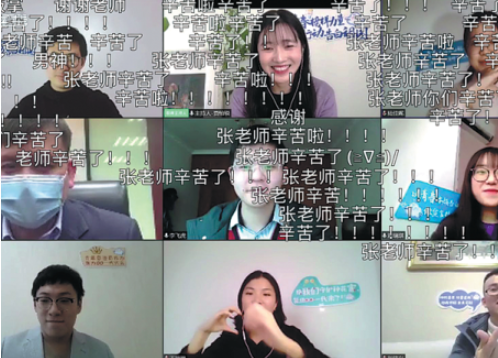Fudan students use wits to fight epidemic


Students from Fudan University hold an online discussion about the epidemic with Zhang Wenhong, director of Huashan Hospital's department of infectious disease and leader of the Shanghai team of experts treating COVID-19 cases.[Photo provided to China Daily]
Fudan University students have been using what they have learned to benefit society during the COVID-19 epidemic, and six of them shared how they have done so during an online forum hosted on video-sharing website Bilibili on March 31.
Organized by the Party branch at Fudan University, the forum was viewed by 68,000 people, according to the university.
Among the students was Liu Jiaxing from the software faculty who joined a task force led by Lou Li, a professor of public health, and helped develop a system for the registration of mask purchases and the distribution of these items.
The system was later used to support registration in 6,000 neighborhoods, 1,100 pharmacies and 58 distributors.
"The biggest challenge for us was the limited time we had. Our team worked continuously for 16 hours to meet the launch date, and we made it," says Liu.
"Although we don't study medicine, we are still eager to do something to help Shanghai respond to the emergency. This was what drew us together."
Another presenter at the forum was Wang Ruilin, a psychology major who, together with the other members of the university's student psychology club, provided counseling services to students from Feb 1 to March 2. The group also helped to counsel families in Hubei province, providing them with advice about how they can manage their children during the epidemic.
Meanwhile, Wen Ruiqi and her classmates from Fudan's school of journalism did their part by writing a paper about how members of the public can differentiate between genuine news and misinformation. Under the guidance of a teacher, Wen and her classmates analyzed around 1,000 posts on Sina Weibo before writing a paper that was published on news site ThePaper.cn.
"Around 70 percent of the rumors we identified do not have a source. This is one of the hints that a story is probably untrue. I hope our work will raise media literacy among the public," she says.
Also featured during the forum was mathematics major Li Feihu, who helped provide tutorials for students who cannot attend school because of the epidemic. He also participated in a project to develop a mathematical model to aid the government's policymaking decisions regarding the outbreak.
"This experience has shown me that mathematical knowledge can be of great use when applied to other fields," he says.




































